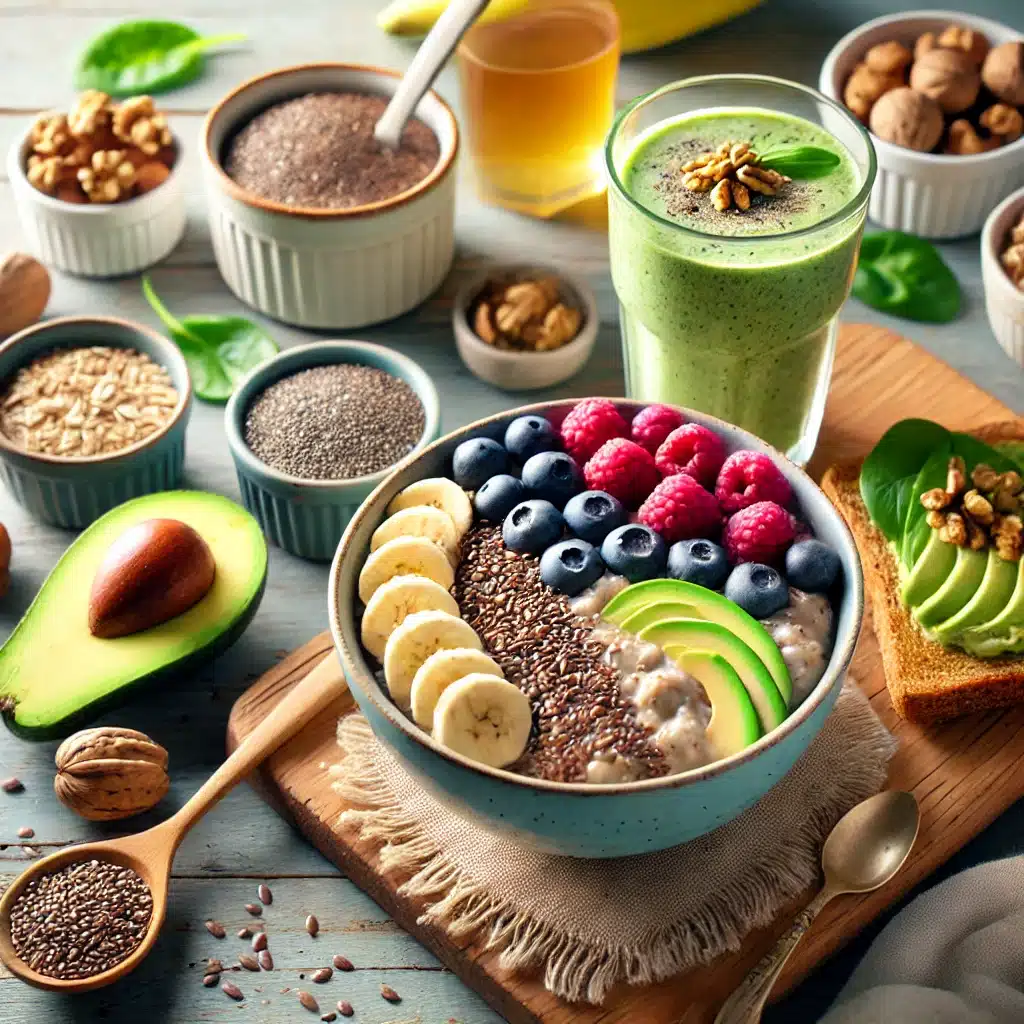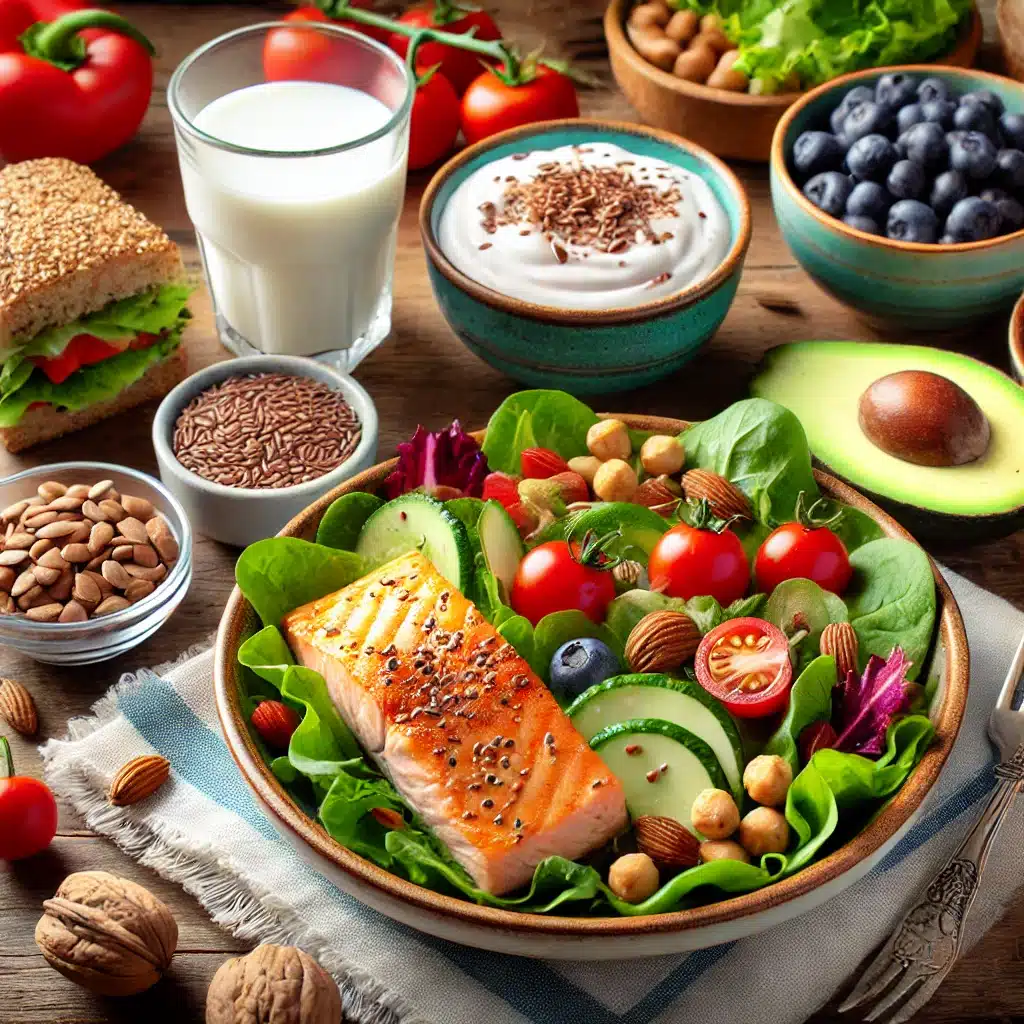Physical Address
304 North Cardinal St.
Dorchester Center, MA 02124
Physical Address
304 North Cardinal St.
Dorchester Center, MA 02124

Menopause is a natural phase in a woman’s life, but it comes with significant changes. Fluctuating hormones can impact everything from metabolism and bone density to heart health and mood. However, the right foods can make a world of difference.
Eating a balanced, nutrient-rich diet can help ease menopause symptoms, boost energy, and support overall well-being. In this guide, we’ll explore the best foods to eat during menopause to keep you feeling your best while maintaining optimal health.

As estrogen levels decline, the body undergoes several shifts that require a fresh look at nutrition. Some of the most crucial dietary considerations during menopause include:
By focusing on these key nutrients, you can create a diet that supports both your body and mind during this transition.
To manage symptoms and promote long-term health, incorporate these powerhouse foods into your daily meals.
Bone density naturally declines with age, making calcium an essential nutrient during menopause. Instead of relying solely on dairy, try these sources:
Muscle mass decreases with age, but getting enough protein can help counteract this. Lean and plant-based proteins can keep your metabolism running efficiently.
Omega-3 fatty acids are essential for maintaining brain function and reducing inflammation, which becomes increasingly important during menopause.
Hormonal changes can slow digestion and lead to bloating, but fiber-rich foods keep things moving smoothly while also helping with weight management.
Phytoestrogens are plant compounds that mimic estrogen in the body, helping to balance hormones naturally.
Dehydration is common during menopause due to night sweats and hormonal fluctuations. Staying hydrated is key to maintaining energy levels.
Just as some foods can help ease menopause symptoms, others can make them worse. While you don’t need to eliminate these foods completely, cutting back can improve your overall well-being.
Refined sugars and processed carbs can lead to blood sugar spikes, energy crashes, and increased fat storage, especially around the abdomen. They also contribute to inflammation, which can worsen joint pain and hot flashes.
🔹 Instead of white bread and pastries, choose whole grains like quinoa and brown rice.
🔹 Swap sugary snacks for fruits and nuts to maintain steady energy levels.
While a morning coffee or an occasional glass of wine may seem harmless, both caffeine and alcohol can worsen menopause symptoms like hot flashes, anxiety, and sleep disturbances.
🔹 Reduce coffee intake and opt for herbal teas like chamomile or green tea.
🔹 If drinking alcohol, stick to moderation—a glass of red wine here and there is fine, but excessive drinking can dehydrate the body and disrupt hormone balance.
Many processed foods contain unhealthy fats, additives, and high levels of sodium, all of which can increase bloating, inflammation, and heart disease risk.
🔹 Avoid packaged snacks and fast food, and opt for whole, natural foods instead.
🔹 Choose homemade meals over processed frozen dinners whenever possible.
Excess salt can cause bloating, increase blood pressure, and contribute to water retention, making menopause symptoms feel worse.
🔹 Reduce processed meats, canned soups, and salty snacks.
🔹 Opt for fresh herbs and spices to flavor meals instead of excess salt.
Eating well during menopause doesn’t have to be complicated. With a few smart meal-planning strategies, you can ensure your diet supports your health without added stress.
A well-balanced meal should include:
✅ Lean protein (chicken, fish, tofu)
✅ Healthy fats (avocado, nuts, olive oil)
✅ High-fiber carbs (vegetables, whole grains, legumes)
Preparing meals in advance can make healthy eating more convenient:
✔ Cook proteins in bulk (grilled chicken, baked salmon, or roasted chickpeas).
✔ Pre-chop veggies for quick salads and stir-fries.
✔ Prepare overnight oats for an easy, fiber-rich breakfast.
Instead of reaching for processed snacks, try these menopause-friendly options:
🥑 Avocado toast on whole grain bread
🥜 A handful of nuts with dark chocolate
🍓 Greek yogurt with flaxseeds and berries
🥒 Hummus with sliced cucumbers and carrots
Eating the best foods for menopause is just one part of the equation. A few lifestyle changes can further support your health and well-being.
As metabolism slows, regular movement becomes even more important.
🏋️ Strength training (2-3 times per week) preserves muscle mass and bone density.
🚶 Walking or yoga helps manage stress and improves flexibility.
💓 Cardio exercises (dancing, swimming, cycling) support heart health.
Chronic stress can worsen menopause symptoms, while poor sleep impacts weight, mood, and overall health.
🧘 Try meditation or deep breathing to reduce stress levels.
🌙 Stick to a consistent bedtime and avoid screens before bed.
🛀 Take a warm bath with magnesium salts to relax muscles and promote restful sleep.
A healthy gut plays a crucial role in digestion, hormone regulation, and immunity.
🥛 Consume probiotic-rich foods like kefir, yogurt, and sauerkraut.
🌱 Eat plenty of prebiotic fiber from onions, garlic, and bananas.
Menopause is a time of transformation, and the right foods can make a powerful difference in how you feel every day. By incorporating the best foods to eat during menopause—such as calcium-rich leafy greens, protein-packed legumes, omega-3-rich fish, and hormone-balancing flaxseeds—you can support your body through this transition.
Small, sustainable changes in your diet and lifestyle can lead to improved energy, better digestion, stronger bones, and balanced hormones. Instead of focusing on restrictions, embrace nutrient-dense foods that nourish your body and enhance your quality of life.
Start by making one small change today—whether it’s swapping refined carbs for whole grains or adding more plant-based proteins to your meals. Your body will thank you!